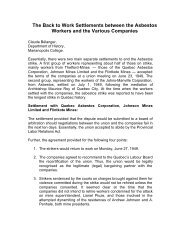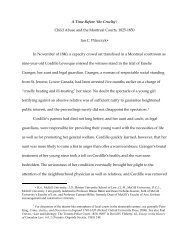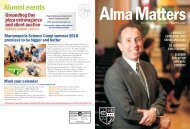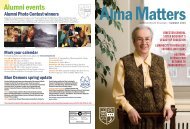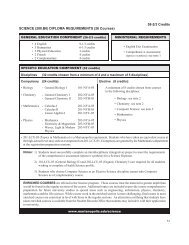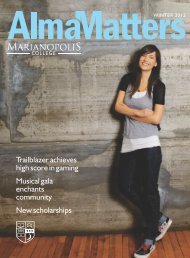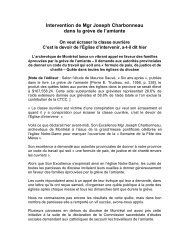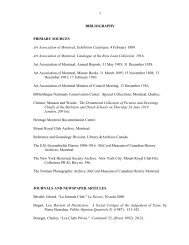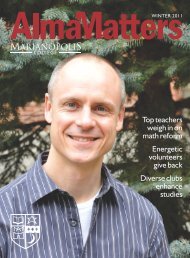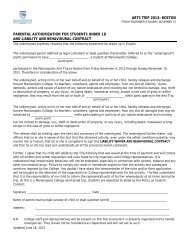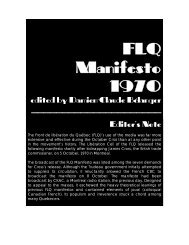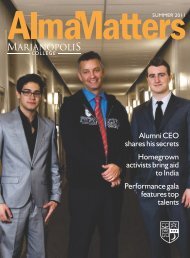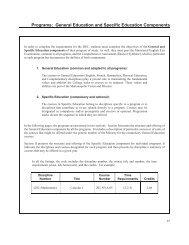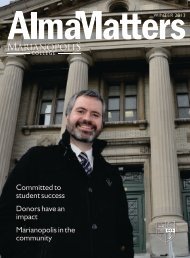2012-2013 Academic Year Calendar - Marianopolis
2012-2013 Academic Year Calendar - Marianopolis
2012-2013 Academic Year Calendar - Marianopolis
You also want an ePaper? Increase the reach of your titles
YUMPU automatically turns print PDFs into web optimized ePapers that Google loves.
Liberal ArtsGeneral EducationComponentIn the General Education componentof the Liberal Arts program studentstake English and humanities coursesthat are dedicated to their program.Certain of these "dedicated" coursesin English and humanities weredesigned for all students and thenfound to be particularly appropriatefor Liberal Arts; in other cases, theywere shaped expressly for thisprogram. As part of the aim offostering interaction with students inother programs when appropriate,the English classes will be taken withArts and Sciences students.EnglishThe four English courses in theLiberal Arts program give studentsa chronological overview of some ofthe great literary works and theircontexts mainly in the westerntradition. As well as amplifying andreflecting other Liberal Arts offeringsin each semester, these courses sharethe standards and objectives for allEnglish courses in the GeneralEducation component.Introduction to College English603-101-MS (2-2-4) 2.66 creditsThis course introduces students topre-classical and classical works intranslation, including selections fromthe Iliad and The Odyssey, andcertain Greek tragedies. It alsoinitiates a process that continues overfour semesters of recognizing literarythemes and techniques in historicaland philosophical contexts, and ofbeing able to speak and write clearlyand effectively about them. Theacademic essay is a special featureof this course.English Literary Survey to 1800603-102-MS (2-2-3) 2.33 creditsDrawing on material from the earlymedieval Beowulf to The CanterburyTales, Sir Gawain and the GreenKnight, and Everyman, the coursealso considers Marlowe's DoctorFaustus, Shakespeare's The Tempestand sometimes Milton’s ParadiseLost. Its framework is to exploredevelopments in the genres of epic,romance, and drama. The coursebuilds on the reading comprehensionand structured writing of Term 1 andoffers practice in writing a wellcrafted,longer essay.English Literary Survey Since 1800603-103-MS (2-2-3) 2.33 creditsIn order to provide the student witha sense of the literary tradition inEngland, the reading in this courseis extensive and diverse, coveringpoetry, fiction, drama, and criticalthought. The course also examinesmajor Romantic and Victorianliterary figures from Blake to Wilde.Throughout the semester, studentsare given exercises and sample essaytasks to prepare them for the EnglishExit Exam.Modernism and Critical Theory(Seminar)603-LPE-MS (2-2-2) 2 creditsThis course focuses on the period ofliterature (1900-1960) known asModernism and on different genres(poetry, fiction, drama, the novel)representative of that period. Studentswill look at works by some of the bestknown modernist authors (Eliot, Joyce,Woolf, Hemingway, and others) whocame to define the ethos of their era. Inaddition, students are taught to applyelements of critical theory (such asNew Criticism, Psychoanalytic Theory,Marxism, Feminism, and Structuralism)as the mode of discourse for theirseminars and critical essays.HumanitiesThree humanities courses in LiberalArts are dedicated to the program.The humanities courses coversuccessive historical periods and arerelated in context or approach to termofferings in English, art historyand/or philosophy. At the same time,these courses attend to the objectivesand standards of the humanitiesdiscipline.Cornerstones of MedievalKnowledge345-101-MS (3-1-3) 2.33 creditsThe "Middle Ages" refers to a periodof European history spanning the1000 years between roughly the 5thand the 15th centuries. Rather thanbeing so-called "Dark Ages", theperiod generated knowledge that hada significant impact on developmentsin subsequent periods. Many areas ofhuman endeavour that are celebratedtoday had their genesis or gotaffirmed during this period, the timeof infancy of our contemporary world.With lectures, discussions, groupwork and other in-class activities, weexplore some of the cornerstones ofmedieval knowledge. Rather thantaking a strictly chronologicalapproach, we will look at the MiddleAges in thematic blocks: Religion andReligious Authority, Culture andLearning, Society, and Knowledge ofthe World. In order to more fullyappreciate their legacy, we alsoexamine and challenge some of thecommon pre-conceived notions aboutthe Middle Ages.Nineteenth-Century Thinkers345-102-MS (3-0-3) 2 creditsThe mid-nineteenth century in Europewas a time of radical social and intellectualchange. This age witnessed thebirth of Marxism and of the theory105



